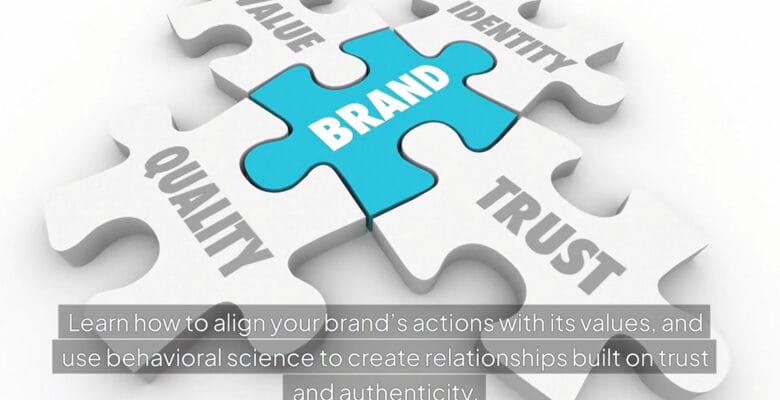Brand trust isn’t built overnight. It’s the product of every interaction, decision, and message your business puts into the world. More than just a buzzword, trust is a measurable factor in customer loyalty, advocacy, and purchasing behavior. But what makes people trust some brands and not others? The answer lies in human psychology.
Why Brand Trust Matters
Trust is foundational in relationships, whether personal or professional. In branding, it drives loyalty, influences purchasing decisions, and transforms customers into advocates. Research shows that 81% of consumers need to trust a brand before buying from it. Trust fuels emotional connections, reduces the cognitive load of decision-making, and provides psychological safety—a key driver in customer retention. Without trust, even the most innovative brands struggle to build lasting relationships.
The Building Blocks of Brand Trust
Consistency: The Comfort of Predictability
The human brain is wired to seek predictability because it reduces uncertainty and stress. Consistency—whether through reliable service, cohesive messaging, or product quality—creates a psychological anchor for customers. It’s not just about being dependable; it’s about signaling reliability repeatedly. For instance, a local coffee shop that remembers a regular’s order fosters a sense of security and care that customers subconsciously value.
Authenticity: Actions That Match Values
Authenticity is a hallmark of trust. When actions align with stated values, customers perceive the brand as genuine. The psychology behind this lies in cognitive dissonance—people distrust brands when their actions conflict with their promises. For example, a fitness company that recalls a defective product while transparently communicating its resolution demonstrates integrity. Authenticity isn’t about perfection; it’s about owning mistakes and acting in alignment with values.
Social Proof and Empathy: The Neuroscience of Connection
Humans are social creatures, and trust often builds through collective validation. Social proof—reviews, testimonials, and endorsements—activates the brain’s reward centers, reinforcing the belief that the brand is trustworthy. Empathy deepens this connection. Neuroscience shows that storytelling activates mirror neurons, fostering a sense of shared experience and belonging. Brands that highlight relatable customer stories or authentic struggles create emotional resonance that lasts.
Breaking Down Barriers: How Brand Trust Is Lost
Brand Trust takes time to build but can be shattered in an instant. The brain’s negativity bias—its tendency to focus more on negative experiences than positive ones—amplifies the impact of a single misstep. Brands erode trust when they:
- Overpromise and underdeliver, creating unmet expectations.
- Send conflicting messages, undermining credibility.
- Fail to address missteps transparently, leaving customers feeling dismissed.
For example, a global retailer faced backlash when its claims of ethical sourcing were debunked. This inconsistency triggered a trust deficit, highlighting the importance of alignment between brand actions and values. To rebuild trust, brands must address these lapses directly, signaling accountability and a commitment to improvement.
The TRUST Framework for Building and Rebuilding Brand Trust
To help brands navigate trust-building, I’ve developed the TRUST framework based on psychological principles:
- Transparency: Openly share processes, challenges, and values. Transparency reduces ambiguity and fosters trust by providing clarity.
- Reliability: Consistently meet or exceed expectations. Reliability creates a psychological shortcut for customers, reinforcing the brand’s dependability.
- Understanding: Empathize with your audience’s needs and concerns. Active listening and personalized solutions enhance emotional connections.
- Social Proof: Leverage collective validation to build trust. Peer recommendations, user-generated content, and testimonials tap into the brain’s natural inclination to follow the crowd.
- Timeliness: Respond quickly and effectively to issues. Timeliness signals respect for the customer’s time and concerns, reducing friction in interactions.
Brand Trust in Action: Real-World Examples
A Subscription Service’s Transparency Wins Loyalty
A small subscription box company faced delays due to supply chain issues. Instead of remaining silent, they shared candid updates with customers, even including photos of their efforts to resolve the problem. This transparency not only resonated but also turned a potential crisis into an opportunity for loyalty-building.
A Regional Grocery Chain’s Ethical Sourcing Journey
A regional grocery chain gained national attention by openly discussing the challenges of ethical sourcing. Rather than presenting an idealized image, they admitted imperfections and showcased their commitment to improvement. This honesty attracted a new wave of socially conscious shoppers, demonstrating the power of vulnerability in trust-building.
Actionable Takeaways for Leaders
To create a trust-focused brand strategy, leaders should:
- Use the TRUST framework to evaluate and enhance their brand’s trustworthiness.
- Conduct regular “trust audits” to identify and address inconsistencies.
- Integrate customer feedback into decision-making and communication strategies.
- Embrace storytelling that highlights relatable, authentic experiences.
- Develop a proactive crisis response plan to manage potential trust gaps effectively.
Conclusion: Building Brand Trust, Building Brand Legacy
Brand Trust isn’t static; it’s a dynamic relationship shaped by every interaction a brand has with its audience. By embedding psychological principles into your strategy and applying the TRUST framework, you can foster deeper, more meaningful relationships. Trust doesn’t just drive business success; it creates a legacy of connection and reliability. What will your brand do today to earn that trust?
Explore how to build authentic, trust-driven brands by diving deeper into the psychology of consumer behavior. Enroll in the Behavioral Branding Masterclass today and start creating connections that last!
